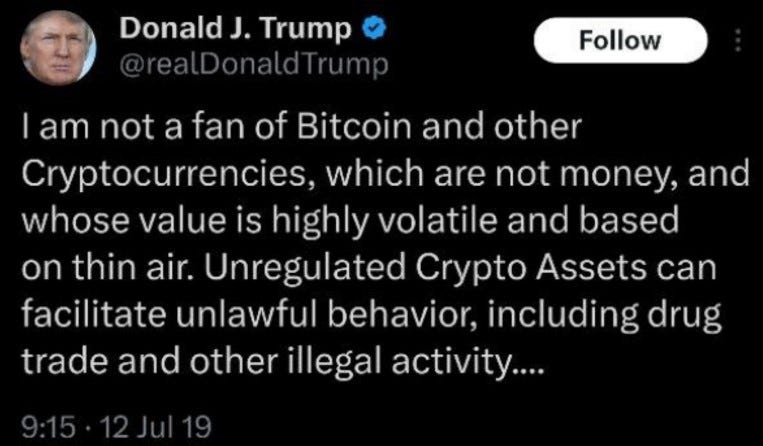The Fourth Industrial Revolution and Its Consequences Will Be a Delight for the Human Race
What do you think of the permissioned middle?
The Fourth Industrial Revolution
Previous industrial revolutions have been accretive to the state, corporations, and the individual in varying degrees. This means that every entity benefited economically and productively in some capacity from the technological developments in each. Everyone won.
The Fourth Industrial Revolution (FIR) stands alone as the first one that is detractive to the state and corporations, and accretive to the individual. This creates a structural conflict between these three and means the very nature of some technologies in the FIR are inherently political, even if they don’t intend to be.
FIR technologies are the first cohort of innovations designed not to primarily enhance productivity or efficiency, but to facilitate a form of open access and sovereignty. It accomplishes this at the expense of certain kinds of efficiency.
Anything that benefits the individual to the detriment of the state is, necessarily, a political creation. A redistribution of power from one group to another is definitionally political. That means these technologies are inextricably political, because of who and what they disintermediate. There is no getting around this.
This essay will review why you should be thrilled about the Fourth Industrial Revolution and its consequences. Something I personally find to be, a delight.
Decentralization and Its Consequences
DeFi, web3, and crypto are Fourth Industrial Revolution technologies.
DeFi (decentralized finance) is the infrastructure that crypto runs on. It encompasses blockchains and applications that exist natively atop these blockchains.
Web3 is a catchall term for compute and financial infrastructure that allows you to use the internet and monetary resources in a decentralized, open way. Web3 can also refer to DeFi (though crypto people tend to not say web3).
Crypto means a digital asset that exists onchain and can be transacted with in DeFi/web3. I will use “crypto” and “DeFi” interchangeably.
On an aside: I personally can’t stand the term “cryptocurrency”; it’s a misleading misnomer. Most of what’s being made here is not trying to be a currency. Currencies are stable units of account used to express relative, not absolute, value. They are rarely owned for investment like a stock or commodity is. Crypto is overwhelmingly composed of digital assets and commodities meant for investment, preservation of capital, and speculation. They are anything but stable in price. Crypto can act like a currency in trade, but it’s much, much more than just currencies.
Unlike industrial revolutions before it, the Fourth Industrial Revolution’s sole motivation isn’t to optimize human activity, it’s to disintermediate the permissioned middle. FIR technologies are armored against censorship, not calibrated for speed and throughput; this is a characteristically political objective.
Previous industrial revolutions have been largely apolitical, serving only to magnify productivity and efficiency. They have been accretive to the state, corporations, and the individual.
The Fourth Industrial Revolution exists to disintermediate the existing structures of finance and compute. It provides permissionless access and sovereign self-custody at the expense of engineering efficiency. It is detractive to the state and corporations, and wildly accretive to the individual.
FIR technology cannot be compared to previous industrial revolutions insofar as the coordination and adoption problems it will face. Crypto is cool tech, but it’s not just cool tech.
The Difference Between a Blockchain and a Database
A blockchain and a database is a distinction without a difference insofar as the literal functions they perform: storing data. Blockchains are simply databases, so why did we create a new term for them?
It’s how blockchains execute their database functions that matters. Including major differences in how they’re accessed, controlled, and updated.
Why is the ability to update and control databases such a political issue?
Seen purely from an engineering perspective, a blockchain is an inefficient database. Sad! Who asked for slower, clunkier databases?
To decentralize is to sacrifice performance, why do this?
A blockchain is a decentralized database that no single entity controls. It’s a ledger collectively updated by a global network, secured with cryptography.
A corporation is a centralized database that one entity controls. It’s a ledger updated and controlled by a company or the state (a company is de facto controlled by the state via regulations). It can be censored and gatekept by the entity maintaining the database.
A decentralized database is not governed, censored, or gatekept by any single party, whereas a centralized database is. Everyone can use a decentralized database (blockchain), they can’t get kicked off it, and don’t need to ask for permission to do so.
There are massive political implications for something so innocuous-seeming as open-access to financial databases….
Decentralization is a Means, Not an End
Decentralization of infrastructure is a defense mechanism against censorship, and in service of permissionless access. It’s an engineering decision that creates a robust, open system that one entity cannot commandeer or manipulate. It’s a means to an end. A tool. It is not a feature.
The goal of decentralization is to produce the traits of censorship resistance and permissionless, anonymous access; I will collectively refer to these traits as “open access”. If decentralization did not produce these traits, there would be no reason to decentralize anything.
Centralization means one entity controls the infrastructure. This is by far the most-efficient way to engineer something, but also the most censorable. You trade off open access for efficiency when you centralize.
Decentralization means many disparate entities act in concert to update the infrastructure, and none of them unilaterally control it. You trade off efficiency for open access when you decentralize.
The distributed global computing consensus that a blockchain uses is less performant compared to a company ledger, but produces the traits of open access for anyone with an internet connection.
When you decentralize a form of coordination, you’re axiomatically imbuing greater latency and complexity. Having one guy and one server manage things has much higher throughput and performance than needing many to coordinate to do so.
However, decentralizing this consensus process is the only way you can sustainably offer open access. Decentralization sits on a spectrum: the more decentralized something is, the harder it is for someone to corrupt and censor it, because it requires greater collusion between more parties to undermine it.
You don't decentralize because it's easy or fun, but because it vitiates power and oversight from those who manage the permissioned middle.
Who gatekeeps the permissioned middle? The state and corporations. Everything that’s managed by them, you use at their pleasure; everything you use in DeFi, you use at your leisure. There is no permissioned middle in crypto, because blockchains are not permissioned.
A Politically Optimized Technology
DeFi’s strengths of open access could not be more in conflict with and antithetical to how the state and corporations do things. Immovable object meets unstoppable force. Permissioned access vs open access.
To decentralize your database is to intentionally design it to grant the traits of open access and to circumvent the permissioned middle. This is a political act, masquerading as an engineering decision. This is why crypto is an intrinsically political technology.
DeFi removes the state out of financial infrastructure as its essence. As its core motivation. DeFi is intentionally building inefficient databases and applications because it makes them more impervious to abuse, suppression, and corruption from state and corporate actors.
This means DeFi is not an engineering solution, but a political one. Because it’s an explicitly politically optimized technology, at the expense of engineering optimization.
DeFi makes accessing previously privileged resources and infrastructure a right. And I don’t mean a "right" in some fluffy platitudinous way, I mean we literally can't stop you from using the network.
Web2: Don’t be evil. You must rely on the permissioned middle being a good guy, not censoring you, and allowing you to use it.
Web3: Can’t be evil. We can’t censor you, because there is no permissioned middle where we can do so. This is what “trustlessness” means in crypto; you don’t have to trust us, because we don’t have the ability to be evil by the nature of the technology.
Coinbase, Binance, FTX, Bybit, Kraken, or anything that makes you create an account, provide an email, KYC, etc. are corporate, centralized actors LARP’ing as crypto. These are all corporations with permissioned middles, they are not blockchains, they can ban you for any reason, freeze your account, and censor you. If you can be banned or need to deliver personal information to access the app, you are not dealing with a DeFi platform. This heuristic will never fail you.
In true crypto, no one can seize your assets or kick you off the network. Not because DeFi people are nice and sweet and sing songs in the forest with the woodland critters, but because we literally can’t. Even if we wanted to be evil assholes, there’s nothing we can do. Coinbase can ban you for any reason, a DeFi application cannot. Open access motherfucker, do you have it? Don’t be evil < Can’t be evil.
The Canadian truck driver understands how valuable this is. The American spirit is instinctively drawn to this. The European and Asian will eventually come around.
Permissionlessness: Do You See a Strength or Weakness?
Permissionlessness is a profoundly critical concept for web3 and DeFi. It completely contradicts the rules of states and corporations, who no way operate "permissionlessly"; for them, everything is permissioned. Accessing their infrastructure is not a right, it is a privilege.
Everything DeFi sees as a strength, the state sees as a weakness. These are irreconcilable differences.
Hard power is military and violent force. Soft power is financial and economic coercion and control. The Fourth Industrial Revolution decrements the soft power of states, by way of decentralized financial databases. If you were the US, how would you react to this? Power is never willingly given away... it is taken.
The very nature of what we're building in DeFi implies political action, and thus will require forms of political coordination and messaging. Most in the DeFi industry don't really get this, and continue to be “aww shucks” confused by the open hostility of Western regulators. It is completely logical that they hate us when you understand that a parallel financial system is structurally adversarial to the existing financial system. It erodes their soft power and hegemony.
Sides will have to be taken, because like it or not, you are actively advocating libertarian ideology with this technology. All based on what you think of the permissioned middle and your desire to circumvent it.
Internet money… more serious than it lets on.
Pitching A Cartel: How About You Have Less Territory?
Pretend you’re a crypto guy, and you want to work with the US and convince it to like you.
Your sales pitch to the state when advocating for DeFi will always fundamentally be: "Hey how about you have less power than you do currently? C’mon, the tech is so cool!"
Dress it up with all the lobbyist money and pleasant-sounding kumbaya language you want, this doesn’t change the nature of what crypto does to state soft power: it curtails it. How do politicians and governments historically respond to anything that diminishes their authority? Damn that is some COOL tech, of course you can be in charge now!
Federal and state power is a politician's power; you are asking them to willingly relinquish it when touting crypto. This is the same power the US fought world wars to win, and now forcefully imposes on the global and domestic financial systems. This kind of dominion does not get handed over in a courtroom, it is taken. You cannot "lobby" the CIA.
I break down the game theory of how I envision this playing out in The Vietnam Thesis. For victory, a guerilla doesn’t have to win, he just has to not lose.
“Hey pal, Trump says he’s a Bitcoin president and loves DeFi! What do you have to say to that?”
On Trump’s crypto pivot: Dropping memecoins and saying he likes Bitcoin does not refute any of this structural analysis. He can say whatever he wants, maybe he’ll even be cool to crypto for the next four years. Maybe. What happens after that?
Be careful about what politicians promise during election season. Actions, not words, are what matter. Are 80-year-olds who represent the federal government known for their intellectual and moral flexibility? He works for a machine that is diametrically opposed to us.
DeFi’s success and the state’s financial strength are a dichotomy.
Also, the president has no ability at all to draft legislation and rules around how any industry, let alone ours, is regulated. He is a totem, a spokesman. So, yeah, I’m really glad the next spokesman of the United States says he likes us now. If he were someone with actual concrete legislative and regulatory abilities, I may even be optimistic! Alas…
Remember the “is this real DeFi?” heuristic I shared? Trump’s crypto project is not DeFi, it’s a corporate service feigning otherwise. DeFi without the “De” is just TradFi (traditional finance) with extra steps. His project requires KYC, which means it is not permissionless, thus it is not DeFi. Don’t delude yourself because you like the guy; this crypto stuff is a branding exercise for him until further notice. Yes, he’s way better than Kamala and Co., and my God that’s not saying much.
DeFi must be understood on game theoretic grounds, not legal, in its relation to the state. Only with game theory, not legal theory, will the state’s past and future actions make sense. Case precedent from Doobsie Boobsie vs Calvin Coolidge or whatever laws created well before computers, now applied to stateless parallel financial systems, will not protect DeFi against a mafia that creates and enforces its own rules.
This is what approaching it on game theoretic grounds looks like: what would a cartel do if another cartel encroached on its territory? Would you expect it to be hostile, or look to the law for guidance? Don’t sympathize with the state, empathize: you’d hate us too.
You don’t have to agree with your adversary, but you must understand him. This is fundamentally not a question of law, but of strategy and low-intensity warfare. I discuss this further in the series Generations of War, Business, and Crypto: Part I and Part 2.
How do you think an empire that exerts its supremacy via authority over domestic and international financial plumbing will take to not overseeing it anymore? The US wields SWIFT, the IMF, dollar diplomacy, sanctions, the banking system, the petrodollar, etc. to exert its geopolitical might, and you think you’re going to subvert that in a courtroom or with lobbyists? How did the US earn those capabilities in the first place?
The US physically shed blood for this right. It fought two world wars and built the greatest economy in human history so it could claim the honor of being the financial hegemon. That crown was not given, it was earned and seized. Keep this in mind when you witness the US being hostile to crypto; it’s not unreasonable at all when you grasp its motivations. It’s not irrational for the state to hate us, because it’s not irrational for a dominant cartel to attack an upstart one.
Don't Sympathize with the State, Empathize
The above reaction is not in the slightest bit confusing or misguided. In fact, Krugman’s conclusion is correct when you consider his political affiliations (neoliberal state enjoyer). It’s Nic who’s lacking introspection here by not comprehending the ramifications of his industry.
Crypto is a political threat, by design, to the state’s permissioned middle that Paul and his neoliberal comrades hold dear. Paul can sense his cherished state is under duress! He’s not wrong! In fact, he's right to fear us. We’re literally separating money from state here... what do you guys think that means? Vibes? Essays? Paying a lawyer $3k/hour to interpret Doobsie Boobsie jurisprudence in a magical way that makes the state surrender and lets you replace their global financial network? Ha.
Countries wage wars over this. Nations use soft power to sanction people and put them on lists to get what they want. Intelligence agencies overthrow leaders because of it. Saddam wanted Iraqi oil sold in euros in 2000, and several years later… he was gone. I guess his tech wasn’t cool enough :(
Consensus mechanisms come in many forms: Bitcoin is a Proof of Work chain, Ethereum a Proof of Stake, and the United States is Proof of Violence. It leverages its military and economic heft to enforce and support the dollar globally and impose its will on international finance. I discuss this in The US Dollar: A Proof of Violence Network.
All the justifications politicians use to slander and attack DeFi ("it's for criminals!" "it's money laundering!" "climate and equality, or something!") are just that, client-facing rationales for the real motivations: preservation of soft power.
An unstoppable force and immovable object do not have PR departments that say they're unstoppable and unmovable: they lie about each other and attack. Cartel vs cartel.

Sometimes politicians slip up and suffer from a moment of candid clarity. This clip illustrates what’s actually going on in the bureaucrat’s mind around :22

Motivated reasoning:
When ExxonMobil says anything to assure you Co2 is good, does that surprise you? When cigarette companies suppress research on cancer studies, does that surprise you? When Kamala is asked a question about economics and responds, "Trump abortion LGBTQ#@ Project 2025", does that surprise you? When the Press Secretary mindlessly defends whatever the administration does, are you… surprised? I really hope you’re not.
These political smears against crypto from government employees also should not surprise you, for exactly the same reasons. These people say whatever’s needed to advance their interests.
Political messaging does not need to be honest, it needs to be effective.
DeFi is Useless
Equipped with this understanding of the Fourth Industrial Revolution and its technological consequences (a delight for the human race), you can now infer and triangulate political stances and beliefs… all based on what people think of internet money and the permissioned middle.
If someone tells you DeFi is useless or bad, you can bucket them in one of two ways:
Intellectually unserious
A political opponent
The former will come around when hivemind consensus tells them it's okay to do so; they’ll adopt crypto once everyone else does. The latter will present a problem.
"What's the point of such a technology, who needs your redundant databases….?". Well, if you don’t see the permissioned middle as a threat, but rather a friend, you will find this technology pointless.
If you understand the permissioned middle as a fulcrum of censorship and coercion, it makes intuitive sense to you to build around it.
If you understand the permissioned middle as your ally and think it should dictate to whoever it wants, you'll be continually upset by what we're building and why it exists. You will correctly perceive it as a threat.
These stances have very apparent political implications.
If you don't notice the permissioned middle yet are averse to DeFi, you're simply part of the later stage of S-curve adoption. You’re not an enemy, you just don’t use frontier technology. You probably thought the internet was only for porn and email until everyone else started using it. You need to see social proof before you dabble in something new, you'll come around.
If you notice the permissioned middle (like Krugman) and feel compelled to help it maintain its nexus of control... well, then we have a problem. You correctly interpret crypto to be political and are an open defender of state and corporate domination of financial infrastructure. We are not allies.
Much can be observed by your stance on the permissioned middle.
Some closing thoughts on decentralization and AI….
Decentralization Is Not Fun
Decentralization is similar to a knight wearing 80lbs of armor going into a fight; it makes everything slower and more cumbersome, but it supplies a degree of defense that when you need it, you really need it. All of life’s a tradeoff. Speed or defense, pick one.
As long as you’re not being censored or attacked, decentralization will be an annoying feat of engineering sluggishness and redundancy. Similar to how you don’t need to put on your seatbelt 99% of the time, but that one time you do… boy are you grateful you buckled up.
DeFi as an industry struggles with this. They don’t internalize what they’re creating is political, and the more juvenile factions question decentralization because there hasn’t been a reckoning yet that shows them why the seatbelt is valuable. They’re waiting for this to happen to them before they learn their lesson. “Why am I wearing all this armor and a seatbelt I’ve never gotten into a car accident!”
Prophylactic measures like decentralization are not taken for convenience or performance reasons, but for preemptively protective ones. Holding a shield with your sword limits your striking speed, but saves you when he lunges at you. Fourth Industrial Revolution tech is innately defensive; it’s not primarily tools of convenience, but of freedom.
If you’re judging a technology that’s politically engineered on speed or latency terms, you don’t understand what you’re analyzing. It’s like assessing a tank’s acceleration on a Porsche’s terms, overlooking the true purpose of why the tank is designed the way that it is.
Concluding: On Artificial Intelligence
AI represents another pillar of the Fourth Industrial Revolution. While crypto redistributes power, AI will likely consolidate it through the economies of scale of compute/GPU resources and data.
I believe AI as a technology will be accretive to the state, corporation, and individual in different amounts, whereas crypto only helps the individual. Crypto and AI are poetically at odds, contrasting and complementing each other’s strengths and weaknesses. Symbiotically antagonistic. Artificial abundance and artificial scarcity: a form of digital homeostasis.
The Fourth Industrial Revolution and its consequences will be a delight for the human race, and net detractive to state power. What a time to be alive.
Subscribes and shares are very much appreciated. If you enjoyed the essay, give it a like.
You can show your appreciation by becoming a paid subscriber, or by donating here: 0x9C828E8EeCe7a339bBe90A44bB096b20a4F1BE2B
I’m building something interesting, visit Salutary.io
Related essays:
The US Dollar: A Proof of Violence Network
The US dollar is a network. Similar to how DeFi layer 1s need to show “proof” of something to have the chain work, so does the USD. It’s a Proof of Violence (PoV) network.

















Very true. The digital age belongs to sovereign individuals. We're just getting started. Nation states are walking corpses, but as we all know zombies can be very dangerous even if they're long dead and rotting.
Lunarpunk and Solarpunk web3 movements are very promising, both in their own regards. It's not just about crypto but about the role of technology (especiall AI) in our lives and in our society. It's about rediscovering a new humanism in such nihilistic techno-capitalistic environment. It's about creating new realities thanks to technology, leveraged as an eschatological instrument.
I haven’t finished reading but I love the thesis!